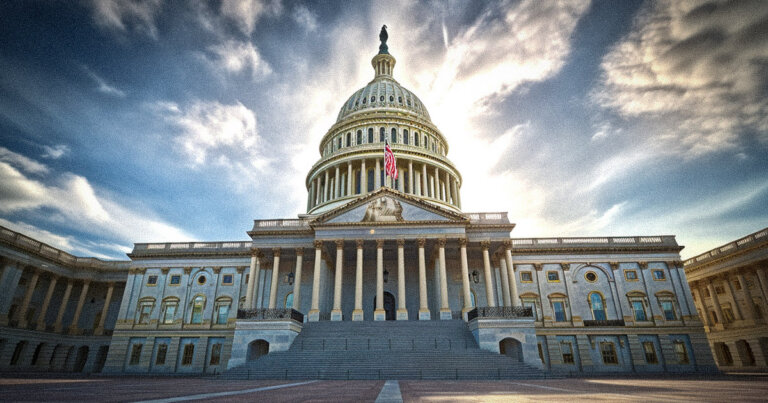 House Financial Services Committee announces ‘Digital Dollar’ hearing as pressure to pass crypto legislation intensifies
House Financial Services Committee announces ‘Digital Dollar’ hearing as pressure to pass crypto legislation intensifies House Financial Services Committee announces ‘Digital Dollar’ hearing as pressure to pass crypto legislation intensifies
2023 has seen a barrage of federal regulatory action against malfeasance in the cryptocurrency industry. Is Congress finally poised to act?

Cover art/illustration via CryptoSlate. Image includes combined content which may include AI-generated content.
The House Finance Committee has announced another hearing on cryptocurrency regulation as demand for congressional action on the virulent industry intensifies.
Held by the Digital Assets, Financial Technology and Inclusion Subcommittee and Entitled “Digital Dollar Dilemma: The Implications of a Central Bank Digital Currency and Private Sector Alternatives,” the hearing will take place at 2:00 PM ET on Thursday, September 14, 2023.
The year 2023 has witnessed a flurry of activity from federal agencies and lawmakers seeking to navigate the rapidly evolving landscape of digital assets. The urgency to implement a cohesive legislative framework has arguably reached a tipping point, spurred by market volatility, investor protection concerns, and the global race to define standards for digital currencies.
Congressional pressure
The cryptocurrency industry has seen increased attention from Capitol Hill this year, with lawmakers on both sides feeling pressure to act.
Leading the charge, Democratic Senator Elizabeth Warren reintroduced the Digital Asset Anti-Money Laundering Act in late July, earning the unexpected backing of Wall Street banks. Aimed at reducing the national security risks posed by cryptocurrencies, the legislation would hold crypto businesses to the same standards and requirements as traditional banks. In a press release, Warren voiced concerns about cryptocurrencies becoming the preferred transaction method among cybercriminals, labeling her bill as the “toughest proposal on the table to crack down on crypto crime.”
The bill, which first appeared in December 2022, is multifaceted. It mandates the likes of crypto wallet providers, miners, and validators to abide by the Bank Secrecy Act, pushing for know-your-customer requirements. The proposed legislation also tasks the Treasury Department, SEC, and CFTC with establishing review processes for crypto businesses, and it directs FinCEN to close regulatory gaps, particularly those surrounding self-custody wallets.
Warren is not the only voice in Congress calling for regulatory clarity. Just two days before Warren’s announcement, the House Financial Services Committee advanced a set of seven crypto-related bills. This Republican-led initiative, which included legislative efforts from Chairman Patrick McHenry, Rep. Warren Davidson, and Rep. Bill Huizenga, addresses various facets of digital asset regulation, from stablecoins to SEC disclosures.
However, the comprehensive package hasn’t been free from criticism. Democratic Representative Maxine Waters pointedly noted that the bill appeared to cater more to the crypto industry’s interests rather than the broader public or the views of other regulatory bodies.
In June, Waters also sought feedback from the SEC and the Treasury Department on the Digital Asset Market Structure Discussion Draft, a Republican-led legislative proposal. This bill, primarily targeting the delineation of a cryptocurrency as a commodity or security, also set out to clearly demarcate regulatory responsibilities.



 CryptoQuant
CryptoQuant 
















































































